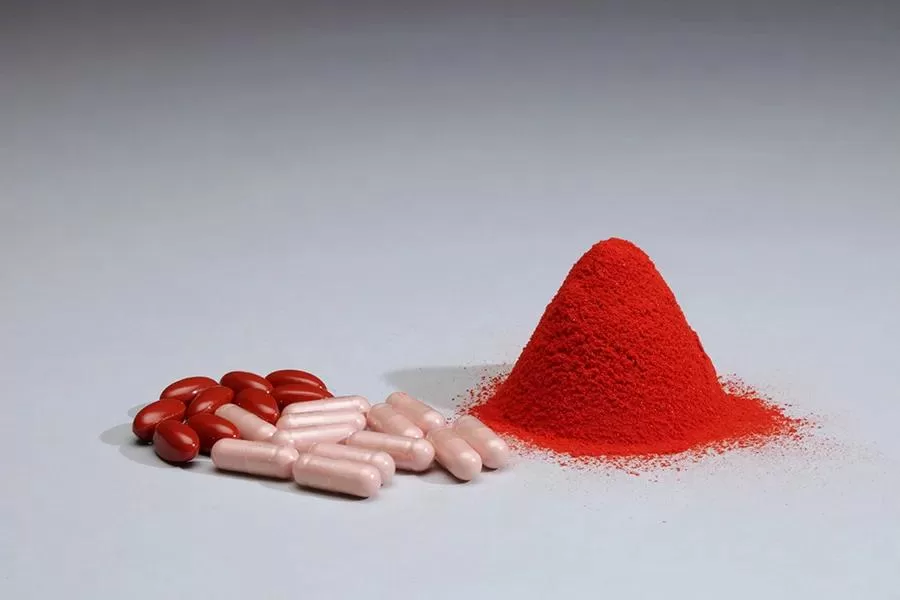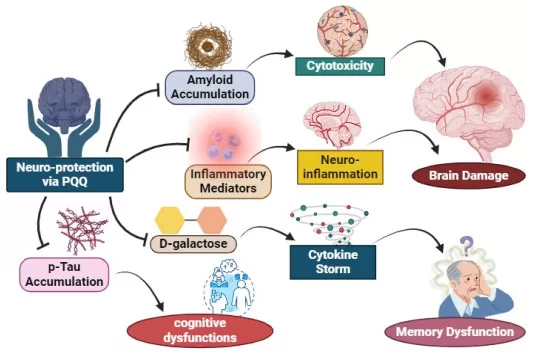Can PQQ Really Help With Energy, Focus, and Healthy Aging?
September 12
Pyrroloquinoline quinone (PQQ), a compound naturally found in foods like dark chocolate and green tea, has recently drawn attention in the health and wellness world. Early studies suggest potential health benefits, though more research is still needed. Fortunately, PQQ supplements appear to carry minimal risk.
PQQ is often promoted for boosting energy, sharpening mental focus, and supporting longevity—but how much of this is backed by science?
This article breaks down what current research says about PQQ supplements and their potential benefits.

What Exactly Is PQQ?
PQQ, or pyrroloquinoline quinone, is a compound produced by bacteria that helps them digest alcohol and sugars to generate energy. It is found in some fruits and vegetables, as well as in human breast milk. PQQ is also known as methicillin or pyrroloquinoline quinone disodium salt.
PQQ is essentially a coenzyme that supports mitochondrial function. Simply put, mitochondria are like the cell’s “power plants.” Without them, the body would be as sluggish as an old laptop that hasn’t been charged. An increase in mitochondrial numbers leads to increased energy production.
PQQ is also an antioxidant with anti-aging properties. Research suggests that PQQ may help boost cognitive function, enhance support for brain health and memory, and have neuroprotective effects. It also has the potential to promote cardiovascular health, reduce inflammation, and promote healthy aging, making it an exciting long-term health supplement.
How PQQ Works in the Body?
PQQ plays a vital role in human cells, activating mitochondrial biogenesis. Mitochondria are the cell’s “powerhouses,” responsible for generating the energy needed for cellular activity.
PQQ significantly increases the number and activity of mitochondria, thereby improving cellular energy metabolism efficiency, enhancing physical performance, and combating fatigue.
PQQ also promotes the synthesis of nerve growth factor, which is essential for the development and maintenance of the nervous system. It protects neurons from damage, promotes nerve cell growth and repair, and helps prevent and improve neurodegenerative diseases and maintain good cognitive function.

PQQ (pyrroloquinoline quinone), as a cofactor for oxidoreductases, primarily works in the body through the following mechanisms:
Antioxidant Properties
PQQ neutralizes harmful free radicals, which are unstable molecules that can damage cells. By reducing oxidative stress, PQQ protects cells from damage associated with aging and chronic diseases.
Mitochondrial Support
PQQ plays a crucial role in mitochondrial function, the powerhouses of cells that generate energy. It enhances mitochondrial activity, supports the creation of new mitochondria (biogenesis), and boosts the production of ATP, the cell’s primary energy source.
Redox Cofactor Activity
PQQ acts as a cofactor for enzymes involved in oxidation-reduction (redox) reactions. This ability allows it to catalyze continuous redox reactions, contributing to cellular efficiency.
Neuroprotection
PQQ protects nerve cells from damage and promotes their repair and regeneration. It can also enhance Nerve Growth Factor (NGF) production, which is vital for the growth and survival of neurons.
Anti-inflammatory Effects
PQQ can reduce inflammation in the body by modulating inflammatory pathways and decreasing the production of pro-inflammatory cytokines.
The Potential Benefits of PQQ
Boosting Mitochondrial Function
One of PQQ’s primary benefits is its effect on mitochondria, the organelles that provide energy for cells. In fact, it’s often combined with other energy-boosting compounds, such as Coenzyme Q10, to help enhance mitochondrial health. It works by stimulating mitochondrial biogenesis (the production of new mitochondria).
Symptoms of mitochondrial dysfunction include slowed growth, muscle weakness, neurological problems, gastrointestinal issues, and an increased risk of infection.
Boosting Brain Function
While many people begin taking PQQ supplements to combat fatigue and boost energy levels, some research suggests that PQQ may actually have beneficial effects on brain function.
A 2016 study found that PQQ increased blood flow to the brain, potentially helping to prevent cognitive decline and dementia in older adults. The findings suggest that PQQ may protect against declines in brain function, particularly in attention and working memory.
Similarly, an animal study published in the Journal of Clinical Biochemistry and Nutrition demonstrated that PQQ reduced oxidative damage to cells, potentially preventing neurodegeneration and improving memory in rats.

Relieves Inflammation
Acute inflammation is a normal immune system response, helping to fight foreign invaders and reduce the risk of infection. Chronic inflammation, on the other hand, can negatively impact health. In fact, inflammation is believed to be a root cause of disease and may contribute to chronic conditions such as cancer, heart disease, and diabetes.
PQQ possesses antioxidant properties, helping to neutralize harmful free radicals, preventing cell damage and inflammation. In fact, a study published in the Journal of Nutritional Biochemistry showed that after just three days of PQQ supplementation, multiple inflammatory markers were significantly reduced.
Reduces Oxidative Stress
PQQ possesses powerful antioxidant properties, helping to protect cells from oxidative stress and damage caused by the accumulation of harmful free radicals. This can have profound benefits, as research suggests that antioxidants play a central role in health and disease.
Multiple studies have confirmed PQQ’s ability to combat oxidative stress. A test-tube study at Hokkaido University in Japan showed that PQQ helped prevent neuronal cell death caused by oxidative stress, which may benefit neurological conditions such as Parkinson’s disease.
Another animal study found that PQQ may reduce the risk of osteoporosis by inhibiting DNA damage, reducing cell death, and blocking oxidative stress in mice.
Potentially Extends Lifespan
Impressively, some studies have found that taking PQQ supplements may offer benefits beyond brain health, disease prevention, and energy production. In fact, a promising new study suggests that PQQ could even serve as a lifespan-extending drug, helping you live longer.
PQQ is integral to mitochondrial function, which may be involved in controlling lifespan and the aging process.
However, it’s important to note that current research is limited to test-tube and animal studies, and more research is needed to evaluate PQQ’s effects on human lifespan.
Promotes Heart Health
Cholesterol, a waxy substance found throughout the body, is essential for health. It forms the basis of cell membranes and is used to produce hormones, fat-soluble vitamins, and bile acids. However, high cholesterol levels can clog blood vessels, forcing the heart to work harder to pump blood, increasing the risk of heart attack and stroke.
Some studies suggest that taking PQQ supplements can help control cholesterol levels, thereby reducing the risk of heart disease.

Improves sleep
If you frequently wake up feeling exhausted, PQQ may be able to help. It has been shown not only to improve sleep quality but also to help you fall asleep and sleep longer.
Weight Management
PQQ may also aid in weight management. It is thought to influence metabolism—the process by which the body converts food into energy.
By optimizing this process, PQQ may help maintain a healthy weight. Furthermore, PQQ may help prevent fat accumulation by affecting how the body stores and uses energy.
While PQQ is not a weight loss product, it can complement a balanced diet and regular exercise, providing an additional tool in your weight management strategy.

Is PQQ Safe? Side Effects & Caveats
While PQQ is generally safe, some people might experience mild side effects like stomach discomfort or headaches, especially if they take high oral doses. These side effects are rare, but it’s always a good idea to start with a small amount and see how your body reacts.
PQQ Common & Mild Side Effects
- Gastrointestinal Upset: Some users experience mild nausea, stomach pain, diarrhea, or bloating.
- Headache: Increased cellular energy from PQQ may cause mild headaches in sensitive individuals.
- Fatigue or Dizziness: While PQQ is taken to enhance energy, some users report a paradoxical effect of fatigue or light-headedness, potentially due to changes in cellular metabolism or circulation.
- Allergic Reaction: Though uncommon, some individuals may be hypersensitive to PQQ or other components in the supplement.
Considerations Before Taking PQQ
- Consult Your Doctor: Always talk to a healthcare provider before adding PQQ to your supplement regimen.
- Choose High-Quality Products: Opt for a high-quality PQQ supplement that has been tested for purity and potency by a third-party organization.
- Food Sources: You can also get PQQ from foods like spinach, parsley, carrots, oranges, tomatoes, bananas, green tea, and dark chocolate.
- Medication Interactions: It’s unknown if PQQ interacts negatively with other medications, so it is crucial to consult a healthcare provider before taking it, particularly if you are on other medications or supplements.
QQ vs. Other Supplements
Here is the breakdown of the benefits between PQQ and other antioxidants for your health:
| Aspect | PQQ | Vitamin C | Vitamin E | Coenzyme |
| Primary Function | Mitochondrial biogenesis, cellular energy, neuro-protection | Immune support, collagen production | Protects cell membranes, skin & eye health | Supports heart health, cellular energy |
| Antioxidant Type | Potent antioxidant, long-lasting | Water-soluble antioxidant | Fat-soluble antioxidant | Fat-soluble antioxidant |
| Mitochondrial Support | Creates new mitochondria, improves energy | No direct mitochondrial benefits | No direct mitochondrial benefits | Improves mitochondrial efficiency |
| Cognitive Benefits | Promotes neuron growth, protects brain health | Minor cognitive support | Minimal cognitive support | Limited cognitive support |
| Heart Health | Reduces oxidative stress, supports heart cells | Limited heart health benefits | Protects blood vessels, reduces inflammation | Protects heart cells, improves blood flow |
| Immune System | Reduces oxidative stress, secondary immune support | Strong immune booster | Moderate immune support | Moderate immune support |
| Skin Health | General antioxidant protection | Promotes collagen, supports skin healing | Protects skin cells from damage | Limited skin benefits |
| Duration of Effects | Long-lasting effects | Short-lived, needs frequent replenishment | Medium-lasting in lipid regions | Medium-lasting effects |
| Anti-Agig Propertis | Reduces oxidative stress, promotes cellular health | Supports collagen for youthful skin | Reduces skin aging, protects cell membranes | Protects mitochondria from aging damage |
| Best For | Enhancing cellular energy, brain health, longevity | Boosting immunity, skin healing | Skin, eye health, and anti-inflammation | Heart health, mitochondrial efficiency |
| Typical Dosage | 10-20 mg/day | 500-1000 mg/day | 15-30 mg/day | 100-200 mg/day |
All antioxidants offer numerous benefits to your body, but PQQ is unique because it can enhance mitochondrial function, promote brain health, and provide long-term protection from oxidative damage.
If you’re looking to boost cellular energy and cognitive performance, PQQ may be your best choice. If you’re looking for immune system support, vitamin C works best; if you need skin or eye support, vitamin E is a better answer; and cardiovascular function seems best with CoQ10.
PQQ in Food: Can You Eat Your Way to More?
Foods high in PQQ include fermented foods, green leafy vegetables, grains, nuts, and meats. A balanced diet is essential.
- Fermented foods: Some fermented foods, such as fermented tempeh, fermented soy sauce, and red rice wine, contain relatively high levels of PQQ.
- Green leafy vegetables: Certain green leafy vegetables, such as spinach, bitter greens, and mustard greens, are also high in PQQ. While moderate intake can benefit human health, avoid excessive intake, as it can burden the digestive system.
- Cereals: Cereals such as brown rice, barley, and oats also contain high levels of PQQ. Eating them in moderation can help improve memory. Beans are also commonly used to supplement PQQ.
- Nuts: Pine nuts, walnuts, flax seeds, peanuts, sesame seeds, and pumpkin seeds are also rich in PQQ. PQQ has potent antioxidant properties, neutralizing free radicals and reducing oxidative damage to cellular tissues.
- Meat: Meats such as beef, pork, and chicken also contain high levels of PQQ and can be consumed in moderation daily.

Even a diet rich in these foods produces only about 0.1–2 mg of PQQ per day. This is enough to maintain basic functions, but far less than the 10–20 mg doses commonly found in supplements.
Supplements provide concentrated doses of PQQ. Our PQQ tablets are formulated with 20 mg of pyrroloquinoline quinone, approximately 20,000 times the PQQ you’d get from a salad. This higher supplemental intake is required to have a measurable effect on mitochondria, cognition, and inflammation in adults.
Who Might Consider PQQ?
- Those who experience constant fatigue and decreased performance.
- People who want to support brain health and improve cognitive abilities.
- Those who are worried about the state of the cardiovascular system.
- Those who want to prolong the youth of the body and protect themselves from age-related changes.
However, it is important to remember that, despite its promising properties, the effectiveness of vitamin PQQ is still being studied, and it cannot be perceived as a panacea for all ills.
Conclusion
PQQ is a promising natural compound that may have a number of health benefits. More research is needed to confirm these benefits, but preliminary results are encouraging. If you are considering taking a PQQ supplement, talk to your doctor or a dietary supplement specialist first.
Get in Touch
If you have any questions, please contact our experts, we are always ready to help you with individual formulations, private label solutions or any other requirements to kick-start your brand!
